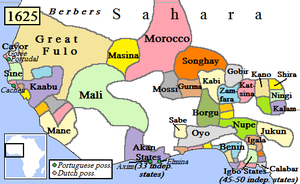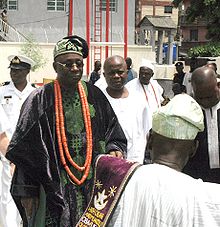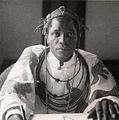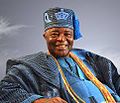
Ifẹ̀ is an ancient Yoruba city in south-western Nigeria, founded in the 6th century. The city is located in present-day Osun State. Ifẹ̀ is about 218 kilometers northeast of Lagos with a population of over 500,000 people, which is the highest in Osun State according to population census of 2006.
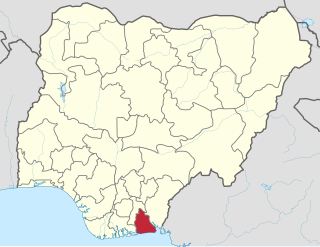
Akwa Ibom State is a state in the South-South geopolitical zone of Nigeria, bordered on the east by Cross River State, on the west by Rivers State and Abia State, and on the south by the Atlantic Ocean. The state takes its name from the Qua Iboe River which bisects the state before flowing into the Bight of Bonny. Akwa Ibom was split from Cross River State in 1987 with her capital Uyo and with 31 local government areas.

The Oyo Empire was a Yoruba empire in West Africa. It was located in present-day southern Benin and western Nigeria. The empire grew to become the largest Yoruba-speaking state through the organizational and administrative efforts of the Yoruba people, trade, as well as the military use of cavalry. The Oyo Empire was one of the most politically important states in Western Africa from the mid-17th to the late 18th century and held sway not only over most of the other kingdoms in Yorubaland, but also over nearby African states, notably the Fon Kingdom of Dahomey in the modern Republic of Benin on its west.
The Royal regalia are the attributes of power of the monarchs of the traditional states in Nigeria.
Obong Victor Bassey Attah was Governor of Akwa Ibom State in Nigeria from 29 May 1999 to 29 May 2007. He was a member of the Board of Trustees of the People's Democratic Party (PDP).

Igboland, also known as Southeastern Nigeria, is the indigenous homeland of the Igbo people. It is a cultural and common linguistic region in southern Nigeria. Geographically, it is divided into two sections by the lower Niger River: an eastern and a western one. Its population is characterised by the diverse Igbo culture and the speakers of equally diverse Igbo languages.
Articles related to Nigeria include:
Ọ̀rànmíyàn, also known as Ọranyan, was a legendary Yoruba king from the kingdom of Ile-Ife, and the founder of the Oyo empire. Although he was the youngest of the descendants of Oduduwa, he became the prime heir of Oduduwa upon his return to claim his grandfather's throne.

The Legends of Africa reflect a wide-ranging series of kings, queens, chiefs and other leaders from across the African continent including Mali, Benin, Ghana, Nigeria, Congo, Ethiopia, Eritrea and South Africa.

Colonial Nigeria was ruled by the British Empire from the mid-nineteenth century until 1960 when Nigeria achieved independence. Britain annexed Lagos in 1861 and established the Oil River Protectorate in 1884. British influence in the Niger area increased gradually over the 19th century, but Britain did not effectively occupy the area until 1885. Other European powers acknowledged Britain's dominance over the area in the 1885 Berlin Conference.
Oba means "ruler" in the Yoruba and Bini languages. Kings in Yorubaland, a region which is in the modern republics of Benin, Nigeria and Togo, make use of it as a pre-nominal honorific. Examples of Yoruba bearers include Oba Ogunwusi of Ile-Ife, Oba Aladelusi of Akure, and Oba Akiolu of Lagos. An example of a Bini bearer is Oba Ewuare II of Benin.

The Akure Kingdom is a traditional state with headquarters in Akure, Ondo State, Nigeria. It is the successor to an ancient Yoruba city state of the same name. The ruler bears the title "Deji of Akure".
Alayeluwa Oba Okunade Sijuwade CFR was the fiftieth traditional ruler or Ooni of Ife from 1980 to his death in 2015, taking the regnal name Olubuse II. He was the traditional ruler of the Yoruba Kingdom of Ile-Ife a traditional Yoruba state based in the town of Ife in Osun State, Nigeria. He was crowned on 6 December 1980 in a ceremony attended by the Emir of Kano, Oba of Benin, Amayanabo of Opobo and Olu of Warri, as well as by representatives of the Queen of the United Kingdom.
The Ilorin Emirate is a traditional state based in the city of Ilorin in Kwara State, Nigeria. It is largely populated by the Yoruba-speaking people, though the kingdom is a hybrid state due to the influence of the many other tribes that make up the city.
This is a list of the royal titles of Yoruba monarchs. It is not in the order of seniority.

Oba Adeyeye Enitan Ogunwusi is the 51st and current Ooni of Ife. He is the traditional ruler and monarch of the Yoruba kingdom of Ile-Ife. He ascended to the throne of his forebears in 2015, succeeding the deceased Oba Okunade Sijuwade, who was the 50th Ooni of Ife.
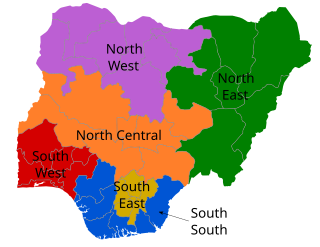
The South South is one of the six geopolitical zones of Nigeria. It designates both a geographic and political region of the country's eastern coast. It comprises six states – Akwa Ibom, Bayelsa, Cross River, Delta, Edo, and Rivers.
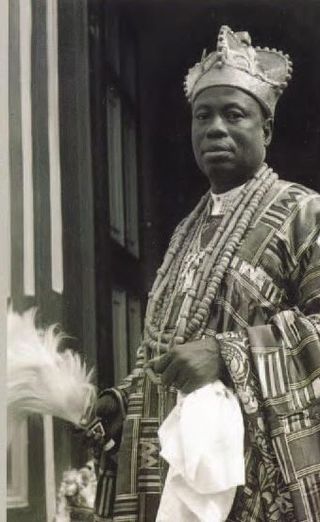
The Nigerian Chieftaincy is the chieftaincy system that is native to Nigeria. Consisting of everything from the country's monarchs to its titled family elders, the chieftaincy as a whole is one of the oldest continuously existing institutions in Nigeria and is legally recognized by its government.
Lowa Ajani Anibijuwon Omisore was a Yoruba aristocratic chief in Ife, British Nigeria who founded the town of Ayepe-Olode and founded the Omisore dynasty. He was granted the title of Lowa by Ooni (King) Adelekan Olubuse I of Ife, making him second-in-command to the Ooni. He subsequently served as a regent and a kingmaker in Ife, crowning Ademiluyi Ajagun and Adesoji Aderemi as Ooni. He led and managed the construction of Ife's major road networks under the wishes of Ooni Ajagun and later founded the town of Ayepe-Olode, which he transformed from a desolate jungle that was previously used by animal hunters.

Philip Osaro Obele is a Nigerian traditional ruler and eleventh Oneh Eh Eleme of Eleme Kingdom since 2019.
